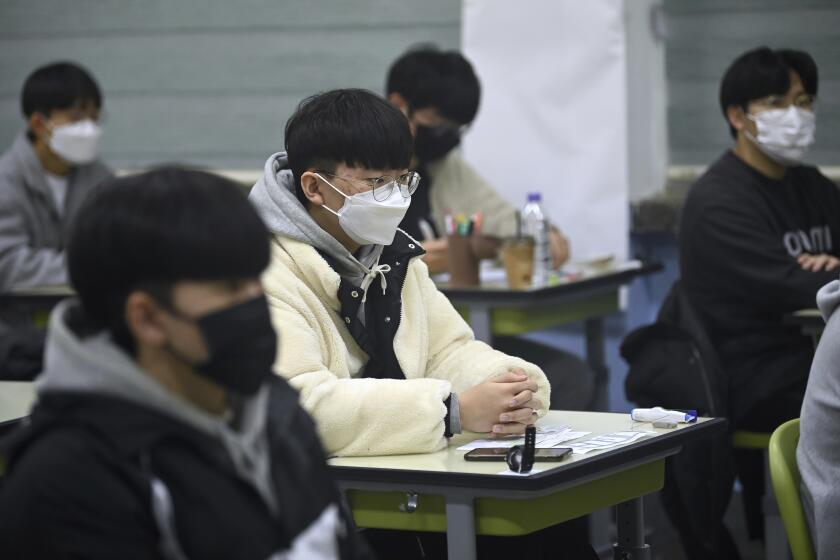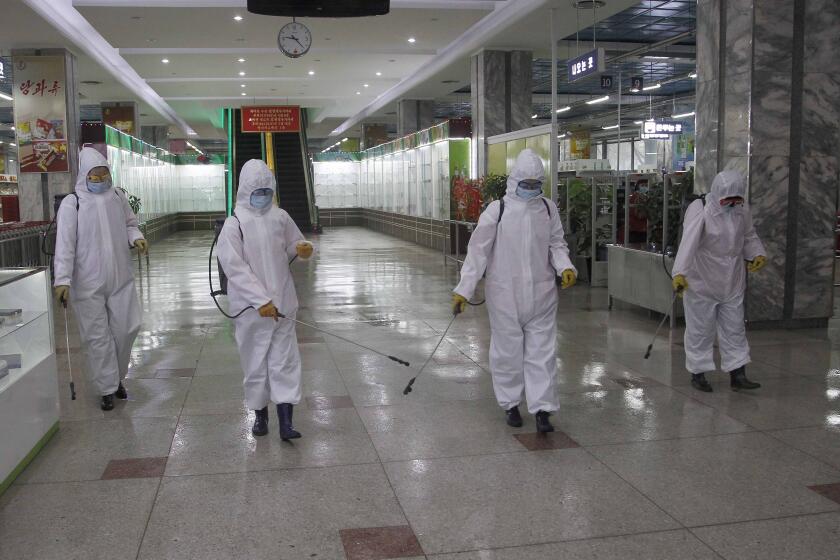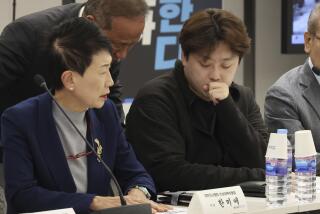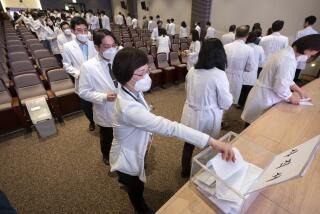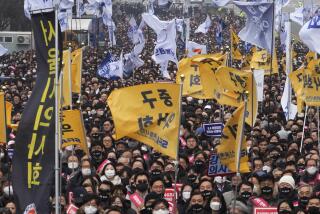South Korea staggers under its worst coronavirus surge since the pandemic began
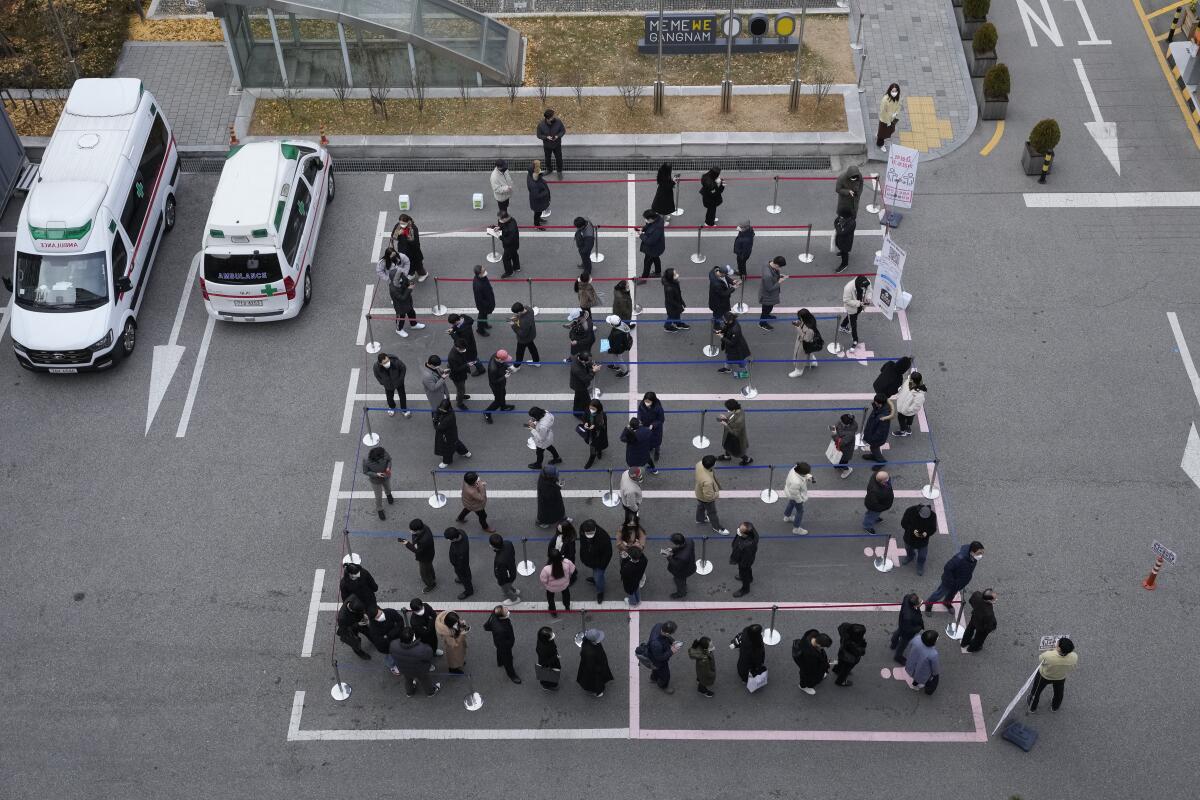
- Share via
SEOUL — New coronavirus infections in South Korea exceeded 7,000 for the third consecutive day Friday in a record-breaking surge that has crushed hospitals and threatens the country’s goals to weather the pandemic without lockdowns.
Critics have blamed the spread on complacency by the government, which dramatically lowered social distancing rules at the start of November in what officials described as the first step toward restoring pre-pandemic normality.
As cases began to soar in recent weeks, officials were initially hesitant to tighten the rules again, citing public exhaustion and frustration with restrictions and their impact on livelihoods. But as the contagious Delta variant reduced the effectiveness of vaccines, most people in their 60s and older still await booster shoots and the first Omicron variant cases were discovered, a sense of urgency has begun to take over.
Prime Minister Kim Boo-kyum said during a coronavirus meeting that the country could be forced to take “extraordinary” measures if the spread doesn’t slow down soon. Officials ordered hospitals around the country to designate 2,000 more beds for COVID-19 treatment.
The increased capacity will be used to ease the crush on hospitals in Seoul and the nearby metropolitan region, where around 90% of intensive care units are already occupied. Officials said more than 1,200 COVID-19 patients in the Greater Seoul area who required hospitalization were being forced to wait at home as of Friday morning because of bed shortages.
Officials have revamped their medical response policy so that most mild cases can be treated at home. While around 20,500 patients are receiving home care, some doctors’ groups say the new approach puts lives at risk.
South Korea reports its biggest daily jump in coronavirus cases as hundreds of thousands of students take the high-pressure college entrance exam.
Kim said the government will also speed up the administration of booster shots by shortening the interval between the second and third injections, from four or five months to three months, starting next week.
“If it becomes clear that we aren’t succeeding in reversing this crisis situation within the next few days, the government will have no other choice but to employ extraordinary anti-virus measures, including strong social distancing,” said Kim, South Korea’s No. 2 official, behind President Moon Jae-in.
South Korea has reported a daily average of more than 5,800 infections, adding more than 41,000 cases in the past seven days alone and pushing the national caseload to 503,000. The country’s COVID-19 death toll stood at 4,130 after 53 virus patients died in the past 24 hours.
In allowing larger social gatherings, longer indoor-dining hours at restaurants and fully reopening schools in November, officials predicted that the country’s improving vaccination rates would help suppress hospitalizations and fatalities, even if the coronavirus continued to spread.
The dispatch of medical supplies to North Korea is a possible sign that the country is easing its COVID-19 border closures to receive much-needed aid.
However, serious cases and deaths have soared among people in their 60s and up, including those whose immunities have waned after being inoculated early in the vaccine rollout, which began in February.
Around 41.5 million people, or 81% of the population of over 51 million, have been fully vaccinated, but only 10% have received booster shots.
New rules that went into effect this week ban private social gatherings of seven or more people in the capital area and require adults to verify vaccination status at restaurants and other indoor venues. But Kim said such measures hadn’t yet showed an effect in slowing transmissions.
Deputy Health Minister Lee Ki-il said officials could further reduce the number of people allowed at social gatherings and restore operating-hour restrictions at restaurants and bars, which were lifted last month, if things continue to look bad next week.
“We will try our best to avoid a lockdown,” Lee said during a briefing.
Some experts have called for stronger measures, such as forcing employers to adopt remote working and increasing government support for small business owners in the devastated service industry to ensure their compliance with social distancing rules.
South Korea has also tightened its borders to fend off the new Omicron variant since identifying its first cases last week, linked to arrivals from Nigeria. Officials said health workers confirmed three more Omicron infections Friday, bringing the known tally to 63.
Scientists say it’s not yet clear whether Omicron is more contagious or dangerous than previous strains of the coronavirus.
More to Read
Sign up for Essential California
The most important California stories and recommendations in your inbox every morning.
You may occasionally receive promotional content from the Los Angeles Times.
